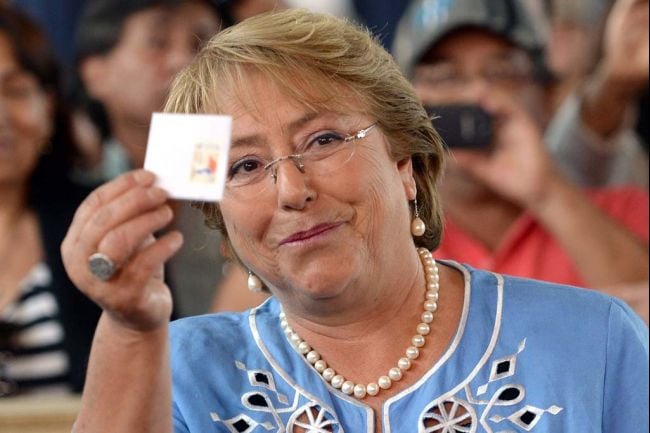
Michelle Bachelet, candidate for president of Chile, casts her vote in Santiago on Dec. 15, 2013. In an election featuring 2 female contenders, Bachelet emerged victorious and will take office for a second time early next year. Photo credit: Martin Bernetti AFP/Getty Images via globalpost.com
2013 has been a year fraught with many challenges for democracy. One could circle the globe and find democratic struggles in every corner of it- from Maldives to Thailand, in Egypt and Iran, Venezuela to Burma, and of course the United States (I still shudder when thinking about the October government shutdown).
Many of these stories I have followed in the past year- please see my archive of articles. But as bleak as things may seem, over and over democracy has proved remarkably resilient. In the face of tyrants and terror, there is always a chance things will improve. In that spirit of hope, as I wrap up this blog for the year I thought I would focus on the progress of democracy in Chile.
On Sunday, Dec. 15, 2013, Michelle Bachelet won the presidential election in Chile. The leftist Bachelet has vowed to improve quality of and access to education for all Chileans, reduce economic inequality, and institute long-needed (according to her) constitutional and electoral reform. She is also open to addressing Chile’s longtime policies making abortions and gay marriage illegal.
Chile’s dramatic and peaceful rise from brutal dictatorship to thriving democracy has been well documented- in brief, most credit the establishment of truth and reconciliation commissions along with free market and trade policies. But more work is needed: Chile’s growth is slowing, the price of the country’s main export copper is falling, and it has the largest inequality level of the 34 Organization for Economic Cooperation and Dev’t (OECD) nations.
Still several aspects of this recent election deserve to be noted. First, election laws were respected. Chile’s constitution does not allow presidents to serve consecutive terms. Bachelet was president from 2006-2010, then stepped down, and has now been reelected according to the law. The presidency changed hands from one party to another, and back again with little conflict.
Second, both candidates in the election were women, a noteworthy feat. With the reelections of Bachelet and Angela Merkel in Germany, it seems clear the presence of women in political leadership roles was not an anomaly.
Third, the will of the people was respected. After progress in a number of areas stalled under the conservative government of Sebastian Pinera, Chileans expressed their frustration and desire for change the best way democracy knows how: in the voting booth.
As a Washington Post editorial noted, “Just as Chile demonstrated to disbelieving neighbors that free markets and free trade could be an engine for rapid growth, it could now show that inequality — the continent’s curse — can be tackled without resorting to reckless populism and authoritarianism.”
I sincerely hope that in 2014 we see many more democracy stories like Chile. The potential is there, it just has to be reached.